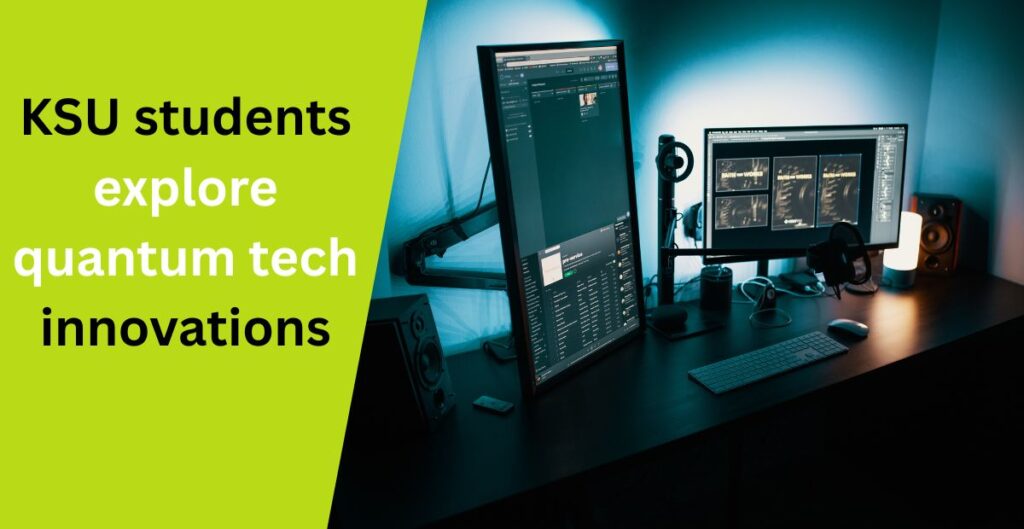Have you ever wished a computer could solve problems faster than ever before? Imagine solving in seconds what takes today’s best computers years. That’s the dream behind the K State quantum computer, and it’s already becoming a reality at Kansas State University.
Let’s break down what this exciting project is, who’s behind it, and why it matters for the future of science, technology, and everyday life.
- Reza Nematirad KSU: Driving Quantum Security Innovation
- ECE KSU: The Engineering Hub Behind Quantum Computing
- K State Engineering Faculty: Mentors Behind the Mission
- Kansas State University Electrical Engineering Faculty Role
- Cpswin: The Tools Making Quantum Design Possible
- Ninghao Zhu Kansas State University: AI and Quantum Together
- K State Hardware Security Lab: Defending the Future
- Tim Sobering KSU: Precision Tools for Quantum Machines
- What's Next for the K State Quantum Computer Project?
- 🔍 Frequently Asked Questions
- 🧭 Final Thoughts: Why the K State Quantum Computer Matters
Reza Nematirad KSU: Driving Quantum Security Innovation
At the center of the K State quantum computer project is Dr. Reza Nematirad, a leading researcher in quantum hardware security. He teaches and researches in the Electrical and Computer Engineering Department at KSU.
Dr. Nematirad works on designing secure and powerful systems that mix the physical and digital world, This includes things like protecting quantum chips from hacking or outside interference.
He believes quantum computing can change how we solve big problems, like protecting sensitive data or making faster decisions in science, healthcare, and national security.
ECE KSU: The Engineering Hub Behind Quantum Computing
The Electrical and Computer Engineering Department at KSU, often called ECE KSU, is where students and researchers come together to explore advanced technologies. This includes work in artificial intelligence, power systems, hardware design, and, of course, quantum computing.
Students here learn not just from textbooks, but by building and testing real devices. For example, they create quantum circuit models, simulate energy systems, and learn how to apply quantum theory to real-world situations.
KSU is preparing students for jobs that don’t even exist yet, because quantum is still so new.
K State Engineering Faculty: Mentors Behind the Mission
The K State engineering faculty includes smart and experienced people who guide the next generation of scientists. Their mission isn’t just to teach, it’s to inspire and lead real-world innovation.
Professors like Dr. Reza Nematirad and others are always asking: How can we take classroom ideas and make them useful in the real world?
That’s why their research often turns into solutions for real problems in cybersecurity, smart cities, climate science, and more.
Kansas State University Electrical Engineering Faculty Role
When it comes to building strong foundations in quantum technology, the Kansas State University Electrical Engineering faculty is essential. Their updated course materials now include lessons on quantum electronics, logic design, and cyber-physical systems.
These programs help students become “quantum literate,” which means they understand the basics of quantum science and can work in growing industries like finance, aerospace, or biotech.
Cpswin: The Tools Making Quantum Design Possible
To make all this work easier, students and researchers use tools like CPSwin. This powerful software helps simulate and test cyber-physical systems, including those related to quantum computing.
With Cpswin, you can build models of smart grids, network devices, and hardware setups to see how they would work in real life. This helps researchers figure out what will work and what won’t, before building real machines.
Ninghao Zhu Kansas State University: AI and Quantum Together
Another brilliant mind at KSU is Dr. Ninghao Zhu. He works at the intersection of AI (artificial intelligence) and quantum research. His goal is to speed up data analysis using quantum algorithms.
In one project, his team created tools to help doctors make faster decisions using AI trained on huge amounts of medical data. The twist? They’re testing how these tools could run on quantum computers for even faster results.
K State Hardware Security Lab: Defending the Future
Quantum computers are powerful, but they’re also delicate. That’s why the K State Hardware Security Lab is so important. It focuses on keeping quantum machines safe from security risks.
In this lab, researchers run tests to make sure quantum chips can’t be hacked or damaged. They also explore how to protect these systems from electrical errors or even environmental threats like temperature changes.
These protections are crucial for future use in hospitals, airports, and military systems.
Tim Sobering KSU: Precision Tools for Quantum Machines
Dr. Tim Sobering helps out behind the scenes through the Advanced Manufacturing Institute at KSU. His job? Helping build parts that quantum devices need, like chips and sensors.
Even though he’s not designing quantum software, his precision machines are helping make the hardware that makes everything else work.
What’s Next for the K State Quantum Computer Project?
KSU is already planning what comes next. New labs, more funding, and student research programs are on the way. Some goals for the future include:
- More undergraduate and graduate quantum courses
- Hands-on student research with industry partners
- Partnerships with other top schools and labs
- Development of photon-based quantum systems
This means more opportunities for students and faster progress for quantum breakthroughs.
🔍 Frequently Asked Questions
Q1: Why did NASA shut down the quantum computer?
NASA did not shut down its quantum program entirely. However, they concluded a partnership with Google’s D-Wave quantum system after testing its abilities. The technology was promising, but not yet practical for many space-related uses.
Q2: What is the current state of quantum computers?
Quantum computers today are still early in development. While companies like IBM and Google have created working quantum machines, they are not yet powerful or stable enough to replace normal computers. However, research is moving fast, especially in universities like KSU.
Q3: What university has a quantum computer?
Many top schools have quantum programs. These include MIT, the University of Chicago, and yes, Kansas State University, which is working hard to build and secure quantum systems.
Q4: How powerful is China’s quantum computer?
China has built several impressive quantum systems. One, named Jiuzhang, reportedly completed a task in 200 seconds that would take a normal supercomputer over 2 billion years. However, these results are hard to confirm independently and are part of ongoing global research.
🧭 Final Thoughts: Why the K State Quantum Computer Matters
The K State quantum computer isn’t just a school project, it’s a leap toward a better future. With leading professors, smart students, and powerful tools, Kansas State University is preparing to change how we think about data, security, and science.
If you’re thinking about studying quantum, investing in technology, or just curious about what’s next, keep your eyes on KSU. They’re not just building computers, they’re building the future.






